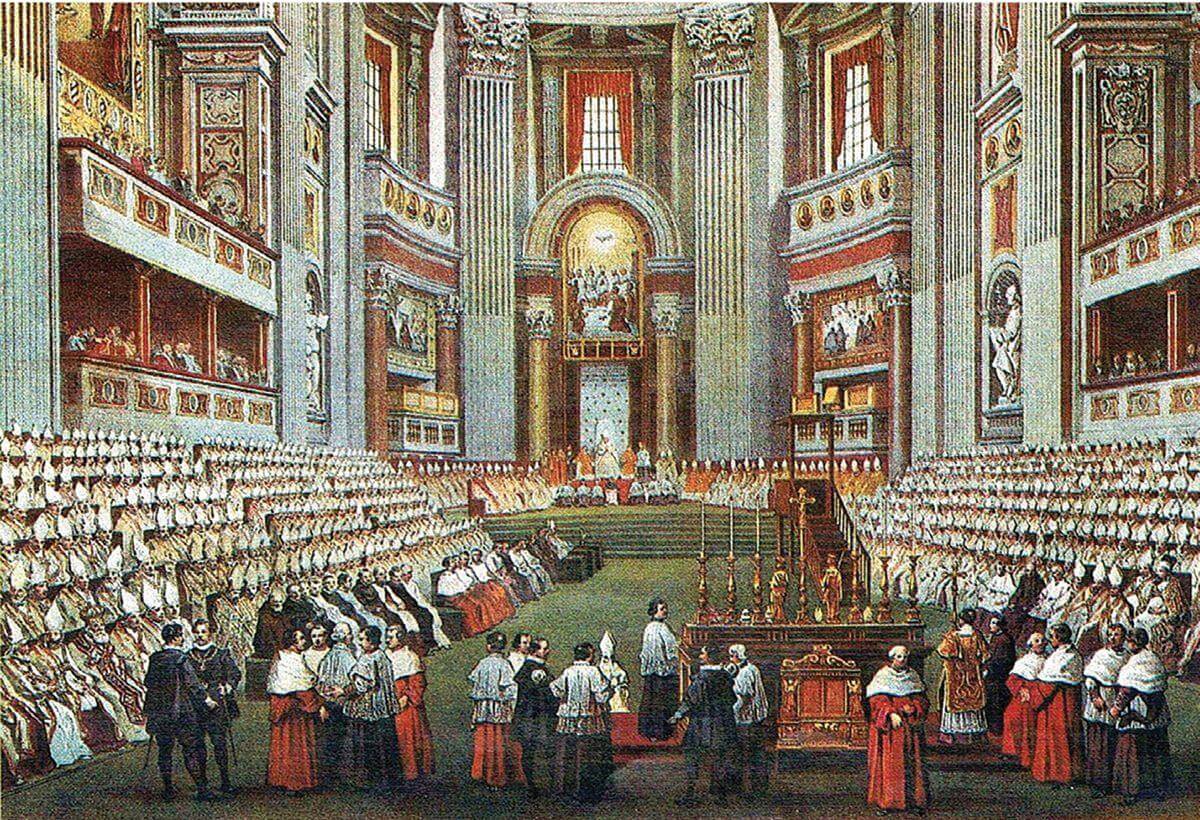Objective and Subjective Principle of Theology
In general, theology is the science about God and about divine realities. As I have written elsewhere, natural theology is confused with supernatural theology in our theological collapse post-Vatican II. Natural theology is a real science based on reason which ascends from the knowledge of the creatures to the knowledge of God. Supernatural theology, or theology in the strict sense, derives its knowledge from principles from Divine Revelation, known by faith. It descends from the knowledge of God and His Revelation to the knowledge of other things.
Theology is essentially a “top-down” science. Its principles are revealed by God supernaturally and publicly. For that reason, a man would not be a true theologian who did not have initial faith, at least unformed. Theology must proceed from the faith. We can say the objective principle of theology is the doctrine revealed by God, while the subjective principle for the work of man in theology is reason illuminated by faith. Therefore, to be a theologian, you must be a man of faith. This is not an exhortation but a necessity!
Dogmatic Faith Necessary for Salvation
Let us define our terms though. We are defining faith according the Vatican I definition, given in the neglected decree Dei Filius:
[Faith is] a supernatural virtue whereby, inspired and assisted by the grace of God, we believe that what he has revealed is true, not because the intrinsic truth of things is recognized by the natural light of reason, but because of the authority of God himself who reveals them, who can neither err not deceive (D 3008).
The act of faith, theological faith, is essentially true, it cannot be false. Heretical theology is not true theology. Again Vatican I:
To enable us to fulfill this obligation to embrace the true faith and persistently to persevere in it, God has instituted the Church through his only begotten Son and has endowed her with manifest marks of his institution so that she may be recognized by all men as the guardian and teacher of the revealed word (D 3012)… Further, all those things are to be believed with divine and Catholic faith that are contained in the word of God written or handed down, and which by the Church, either in solemn judgment or through her ordinary and universal teaching office, are proposed for belief as having been divinely inspired (D 3011).
Faith understood in this way is called dogmatic faith. It totally differs from the false notion of faith that the Protestants believe in, namely, fiducial faith or faith that is a mere confidence in God. More specifically, Protestant “faith” is an act of the will with which each person is firmly persuaded that his sins will not be imputed through the merits of Christ, who has promised the remission of sin.
The faith is dogmatic precisely because it has a content, and as such it is a gift. It also requires the act of faith by man, a response. Remember the objective and subjective principles. Dogmatic faith is necessary for salvation.
Today, the focus on faith as mere confidence, without a content, erroneously turns supernatural theology to mere natural theology. Each man creates his own theology. The speculative or dogmatic aspect of theology is individually or socially fabricated, and hence so is the practical or pastoral element of theology. Focusing on faith as merely a response means that one has invented what he wants to believe in, even who and what God is. So we can see how Protestantism is really at the root of the heresies that plague the Church, and this one is a crucial.
Thomism for the Theological Crisis
Theology needs both speculative or dogmatic theology along with practical or moral theology. You cannot have one without the other. Through Church history, some theologians would emphasize one element over the other. A clear and classic example is that of Saint Thomas and Saint Bonaventure. Saint Thomas believed that sacred doctrine is more speculative than practical, because it deals more with divine things that it does with human acts. Saint Bonaventure emphasized the practical and affective aspects of theology. The reason for this (Saint Bonaventure’s position) is explained well by Theologian Fr. Michaele Nicolau:
Because if the intellect is considered in itself, it is perfected by speculative knowledge; if it is considered as regulating action, it is perfected by practical or moral knowledge; if it is considered in an intermediate way, as born to and extended to the affections, it is perfected by an intermediate habit between the purely speculative and the purely practical, and this habit is wisdom, which consists in both knowledge and affection; theological science is an intermediate habit, and it has for its end both contemplation and that we become good, but primarily that we become good.
Both views stress one aspect over the other, manifesting a real orthodox Catholic pluralism. The truth of course is in the synthesis of both and thus these two saints and doctors of the Church agreed to this, though one emphasized more aspect over the other. The problem, as ecclesiastical history has shown us, is always in an “error of accent”.
Today, to salvage theology, the sacred science needs to focus on and tend towards more the Thomistic position. Theology has to be defended as the “top-down” science in which our faith is based. Theology can never be totally moral or pastoral, as we are seeing today. Let us defend dogmatic theology in order to defend practical theology, by living our faith according to our beliefs.
In the end, may we simply practice what we preach.


